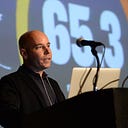It’s Time For A Change In The Fight On Climate Change: Goodbye Attenboroughs, Hello Gretas!
David Attenborough’s documentary “Climate Change — The Facts” is the latest indication that it’s time to say goodbye to the approach that knowledge can ignite action on climate change and adopt a new approach that believes in challenging the system in smart and non-violent ways and in getting people excited about fighting climate change. Welcome to the age of the Gretas!
Last week I celebrated Earth Day watching David Attenborough’s documentary “Climate Change — The Facts”. This is an important film, but what was more interesting in particular was its composition: The 57-minute film can be divided to three parts: The first 42 minutes (74% of the film) focused on the science of climate change, i.e. explaining the problem. Then came 11 minutes (19%), which were focusing on potential solutions. Finally, the last 4 minutes (7%) concentrated on Greta Thunberg and the youth climate strikes around the world.
I don’t think this composition represents any bias of Attenborough against the young people taking action around the world. After all, only last week he said the following in an interview to Outrage & Optimism: “young people may lack experience but they also have clear sight (…). We older ones should take notice of what they say.” I believe it is mainly a reflection of the idea that if we want people to act on climate change, we need to explain better the science and consequences of climate change. If only people understand that climate change is a clear and present danger they will start demanding policymakers and businesses to address it seriously the theory of change behind this idea goes.
I believe this logic is flawed. The best evidence comes from David Wallace-Wells, the author of “The Uninhabitable Earth: Life After Warming”, who makes the following point: “Half of all the emissions that we’ve put into the atmosphere in the entire history of humanity have come in the last 30 years, so we’ve brought the planet… to the brink of catastrophe in 30 years which means we’ve done more damage knowingly than we ever managed in ignorance.”
Another piece of evidence comes from Andrew Hoffman, who explains in his book “How Culture Shapes the Climate Change Debate” that cultural identity can overpower scientific reasoning.
Hoffman explains: “When belief or disbelief in climate change becomes connected to our cultural identity, contrary scientific evidence can actually make us more resolute in resisting conclusions that are at variance with our cultural beliefs. Research by sociologists Aaron McCright from Michigan State University and Riley Dunlap from Oklahoma State University found that increased education and self-reported understanding of climate science corresponds with greater concern among those who already believe in climate change but less concern among those who do not.”
In other words, more knowledge about climate change does not necessarily trigger action. It could actually trigger an opposite response, either because of lack of concern or because of climate anxiety.
Sharing potential solutions doesn’t seem to make much of a difference as well. Paul Hawken’s Project Drawdown, “the most comprehensive plan ever proposed to reverse global warming” is available since 2017 and yet we’re not getting any closer to use the 100 practical climate solutions Hawken offers at the scope required to limit global warming to 1.5C degrees.
Let’s face it — Attenborough’s film represents yesterday’s logic, one that does not seem to move us in the right direction, at least not fast enough. At the same time, we have seen in the last year waves of action worldwide, including global youth climate strikes, the green new deal, Extinction rebellion’s demonstrations in London and the rise of the Sunrise movement in the U.S. These movements and actions have a different theory of change in mind — instead of sharing knowledge to ignite action, they believe in challenging the system in a smart and non-violent ways, and in getting people excited about fighting climate change.
David Attenborough is right when he says at the end of his film that “we now stand at a unique point in our planet’s history”. This is also an important point in the history of the fight on climate change, where we need make a shift and move from the Attenboroughs to the Gretas. While the Attenboroughs did an important job that is key for the success of the Gretas, I believe that their role in the fight over climate change is over now. This is now the time of the Gretas to kick in and get shit done.
This is more than just a generational shift, where the old warriors pass the torch to the young warriors — it is a shift to a new mindset shaped by the radical truthfulness of Greta Thunberg, the excitement of the Sunrise movement, the creativeness of the green new deal, the playful seriousness of the extinction rebellion, and the passion of young strikers around the world.
However, this shift can succeed only if many people will take action. We need not just one Greta, but (at least) 1 million people who just Greta acknowledge that our future is at risk and no one is doing anything about it and therefore feel obligated to take action.
This is why this week we launch the 1M Gretas campaign! We invite people who are taking or are willing to take action that is public, continuous and non-violent to share the details with us, and we’ll add them then to the climate heroes collage we created to show all the amazing people who take action around the world! Our goal is to have 1 million climate heroes by January 1, 2020. So, are you in?
